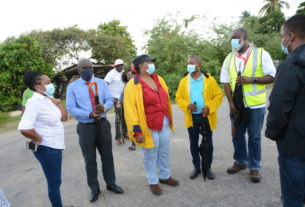Prime Minister Mia Amor Mottley speaking at the official re-opening of the St. Joseph Outpatient Clinic today. (David M. Crichlow – CARIBPIX.)
Prime Minister Mia Amor Mottley has given the assurance that the water woes in St. Joseph will be a thing of the past.
Ms. Mottley made this pledge today as she delivered the feature address at the Official Re-opening Ceremony of the St. Joseph Outpatient Clinic, at Horse Hill, St. Joseph.
Those in the audience included Minister of Health and Wellness, Lieutenant Colonel, Jeffrey Bostic; Attorney General and MP for St. Joseph, Dale Marshall; Government officials and residents of the parish.
The Prime Minister told her audience: “The people of St. Joseph will have water…. There was a problem with garbage and it was solved. There was a problem with buses and it was solved. There was a problem with access to medical services and it has been solved. There is a problem with water and it will be solved…. There will be a new reservoir at Castle Grant, just a couple 100 yards away from the existing reservoir.”
She noted that the reservoir should be built and completed within the next four to six months, but stressed that access to water would not depend on its construction.
“We don’t have to wait for that because what we are doing, and hopefully within two weeks, we shall have the three million gallons from the Ionics plant that has been out of commission…since September last year,” she explained.
Ms. Mottley pointed out that some of the three million gallons of water would be sent to the Trents, Shop Hill and Apes Hill reservoirs. She said eastern St Joseph would then get water on a more regular basis.
“This has not been an easy journey and let us be very clear that the difficulties with water in this country relate to multiple issues. There is a shortage of water as a result of a groundwater crisis and the climate crisis,” she said.
The Prime Minister told her audience that there was a recommendation 40 years ago for a reservoir to be built on the knoll above St. Andrew’s Parish Church but it had never been done.

“The Government has taken a determination and decision with the Barbados Water Authority that that needs to be done and that wherever we have a single reservoir in future as well, we need to move to dual reservoirs in order to be able to allow for redundancy, whether it is as a result of cracks, …damage from whatever climatic events or…simply maintenance, to be able to ensure that the reservoirs are appropriately maintained,” she indicated.

Ms. Mottley noted that a significant number of trucks would be brought in and potable and non-potable water would then be distributed.
SHARON AUSTINILL-MOORE – BGIS




